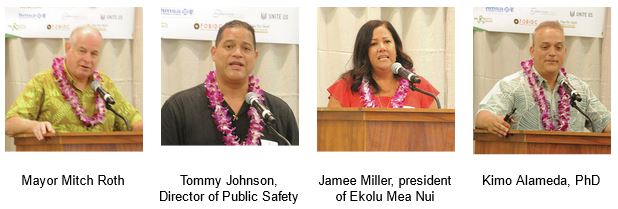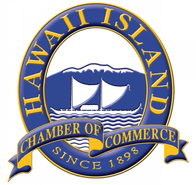|
Photo credit: L Ruminski On Wednesday, August 23, 300 participants from government, private and nonprofit organizations and community members convened at the King Kamehameha Kona Beach Resort to discuss ways of ending the cycle of recidivism through housing solutions, healthcare, employment, and community safety. Read the West Hawaii Today article or copy.
0 Comments
LEAD program to deal with substance abuse, homelessness and low-level crime comes to Big Island11/14/2019
KAILUA-KONA – Law Enforcement Assisted Diversion (LEAD) has come to Hawaii Island, on the heels of early successes on Oahu and Maui.
The pilot project, which received $650,000 in Ohana Zone funding from the state, launched Thursday in Kona. The Big Island Substance Abuse Council (BISAC) will operate the pilot project along with several key partners, including HOPE Services Hawaii, Going Home Hawaii and Bridge House. -- Read the full article in West Hawaii Today-- For those coming out of prison, there are only a handful of residential treatment centers. "We were never going to solve our problems just by locking people up,” Hawaii County Prosecutor Mitch Roth told Civil Beat in July, noting that Hawaii’s prison system was already operating at capacity.
But if incarceration is not the answer to crime, what is? Many criminals in the county’s jails and state prison system have substance abuse problems — if they didn’t commit crimes in order to get drugs or aren’t incarcerated for possession, then the drugs may have impaired their judgment. Getting them off drugs could help. The good news is that Hawaii County has several good programs to help addicts kick their habits. The bad news: Like the prison system, they’re also overcrowded — especially residential programs that can get addicts off the street and into a 24-hour supportive environment. “Very few beds are available for in-patient treatment island-wide,” says Susan Volpe, a counselor at the Lokahi Treatment Center in Pahoa. “Patients for in-patient facilities must wait up to three months. Two or three facilities do detox, but other facilities want patients to come in clean. If they could do that, they wouldn’t have to go there.” Other experts and volunteers in the field said that drug treatment programs on the Big Island also faced shortages of psychiatrists and Certified Substance Abuse Counselors (CSACs). The shortages have deep roots. “Mental health services since 2009 have been really challenging because of the shortages and cutbacks under the Lingle Administration at that time reduced funding for providers of services through the mental health division,” notes Les Estrella, who heads Going Home Hawaii, a nonprofit consortium of agencies and organizations trying to help prisoners transition back to civilian life. “That resulted in higher rates of relapse and recidivism for persons with mental health issues in Hawaii County.” It’s difficult to pin down statistics on the extent of the drug problem on the Big Island, but experts say it’s huge. -- Read the full article by Alan McNarie on Honolulu Civil Beat. -- |
Archives
April 2024
Categories
All
|




